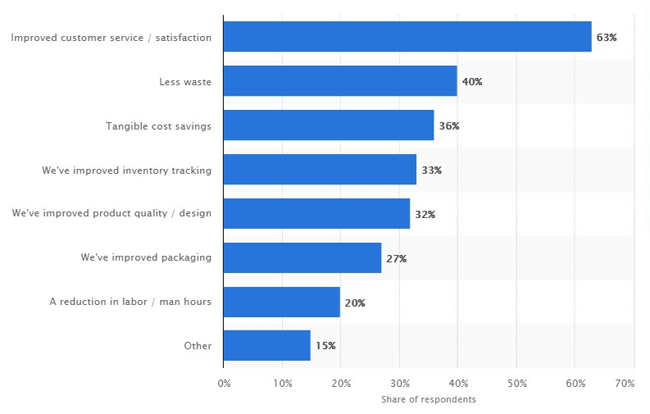An e-commerce business is not just about creating a website or an app. It includes product cataloging, product configuration, procurement of products, and, most importantly, supply chain management(SCM).
Achieving SCM in e-commerce is a difficult task at hand, but, using the technological advancements of Artificial Intelligence, it can be optimized for better enhancements.

These enhancements can help e-commerce businesses manage their supply chain and keep their product replenished with the inventory. There are logistics concerns, too, which can be solved through the Internet of Things technologies and Machine Learning usage.
Let us now discover the unique ways in which AI can help e-commerce SCM!
Inventory Management

Most e-commerce businesses deal with inventory management issues. Of all the challenges retailers face during their business operations, inventory management amounts to 43%, and this is why e-commerce businesses, too, need to manage their inventory well. Certain sections of the inventory management can leverage AI technologies such as:
Warehousing
It is one of the essential parts of any inventory management plan. Warehousing the products, placing them categorically, and effective retrieve of each lot for scheduled delivery takes much effort and effective management. With IoT based devices and smart systems like Automatic guided vehicles or AGVs, warehousing the products can be done quite efficiently.
We have already seen Automated Storage and Retrieval Systems or ASRS revolutionalize warehousing and inventory management, and these technologies can be further powered through machine learning algorithms that access the product data and storage requirements to predict storage plans.
Inventory Tracking
This is another important aspect of inventory management that can be enhanced through IoT based technologies. Procurement of the inventory and receipt of the inventory are just the checkpoints, and there are many more activities that occur between these two activities that need effective tracking. Sensor-based smart devices can help e-commerce businesses track their inventory and make sure it is received securely.
Logistics

Logistics is all about pick up and delivery, and here we are talking about the forward logistics. Forward logistics include scheduled delivery, transport of products, and even inventory management is a part of logistics. We have discussed how inventory management can be made smart by AI and IoT. What remains to be addressed in the logistics part of e-commerce is transit systems.
Transit systems or transportations used in e-commerce logistics are already becoming more advanced. E-commerce giants like Amazon planning on using drones for their product deliveries. Such advanced usage of IoT-based technologies and AI can boost the e-commerce business through quicker services and more happy consumers.
Reverse Logistics

Reverse logistics is retrieving the exchanged products or damaged products delivered to consumers, and they demand to return. The return and exchange facility has been offered by the e-commerce businesses for quite a while now, and it has also incurred high costs on these businesses.
But, despite the costs, e-commerce businesses provide these facilities, the reason being the improved customer satisfaction and branding. Over 63% of such companies have seen improved customer service or satisfaction through reverse logistics through the effective use of AI technologies that can reduce costs.

Statistica 2019
Machine Learning algorithms can help e-commerce businesses cope up with the inventory wastage and transit costs of reverse logistics and keep this facility economically viable for e-commerce businesses.
Product Procurements and Demand Forecasting
Machine Learning can be of great assistance in the product procurement process of your e-commerce business. Machine Learning or ML algorithms use Natural Langauge Protocol (NLP) to analyze the data of demand generation and user's search history on the websites or mobile apps that e-commerce businesses develop partnering up with a mobile app development company. For accurate prediction of the demand and coordination of the supply by effective procurement of the products at the right time, ML algorithms can be trained through three methods such as
Supervised learning is a method where the ML algorithm can be trained to predict the demand generation through the historical search data from the digital database of e-commerce businesses, under the supervision of developers.
While in unsupervised learning, these algorithms are trained without any human intervention. Reinforced learning is the most suitable method for e-commerce businesses as it can leverage the data related to the targeted section of a company or any specific scenario.
CRM Enhancement
Customer Relationship Management can be improved with the use of AI-based technologies. Most of the e-commerce businesses are now looking to digitize their CRM. To achieve more CRM accuracy and consumer satisfaction, AI-based chatbots, and IoT based smart devices like smart speakers can be leveraged.
We have already seen giants like Amazon and Google reinventing the CRM tools with their smart speakers based on voice assistants and IoT technologies. These technologies can be leveraged on different channels like web, Social Media, and others to reach more customers and keep your business relevant.
Signing Off
Supply Chain Management in e-commerce is key to growth and achieving greater customer satisfaction. In the competitive age of e-commerce market and disruptive technologies, lagging behind your competitor due to ignorance of technology, is not liberty you can have.
From the revenue point of view, too, the usage of smart technologies is essential as it improves connectivity with your consumer. Living in a hyper-connected world has its advantages, and it should be leveraged to reach your business goals and grow further. So, if you are an e-commerce business, AI-based technologies are the right kind of leverage you need.

Manoj Rupareliya is the Online Marketing Expert and Blogger. He is an experienced writer with expertise in the field of technology, blockchain, crypto, AI, Digital Marketing and SEO. All the blogs he writes are aimed at providing credible help and insights for readers who want to stay updated all the time.
Linkedin | TwitterAuthor // Manoj Rupareliya

Nice Post. Thanks For Sharing